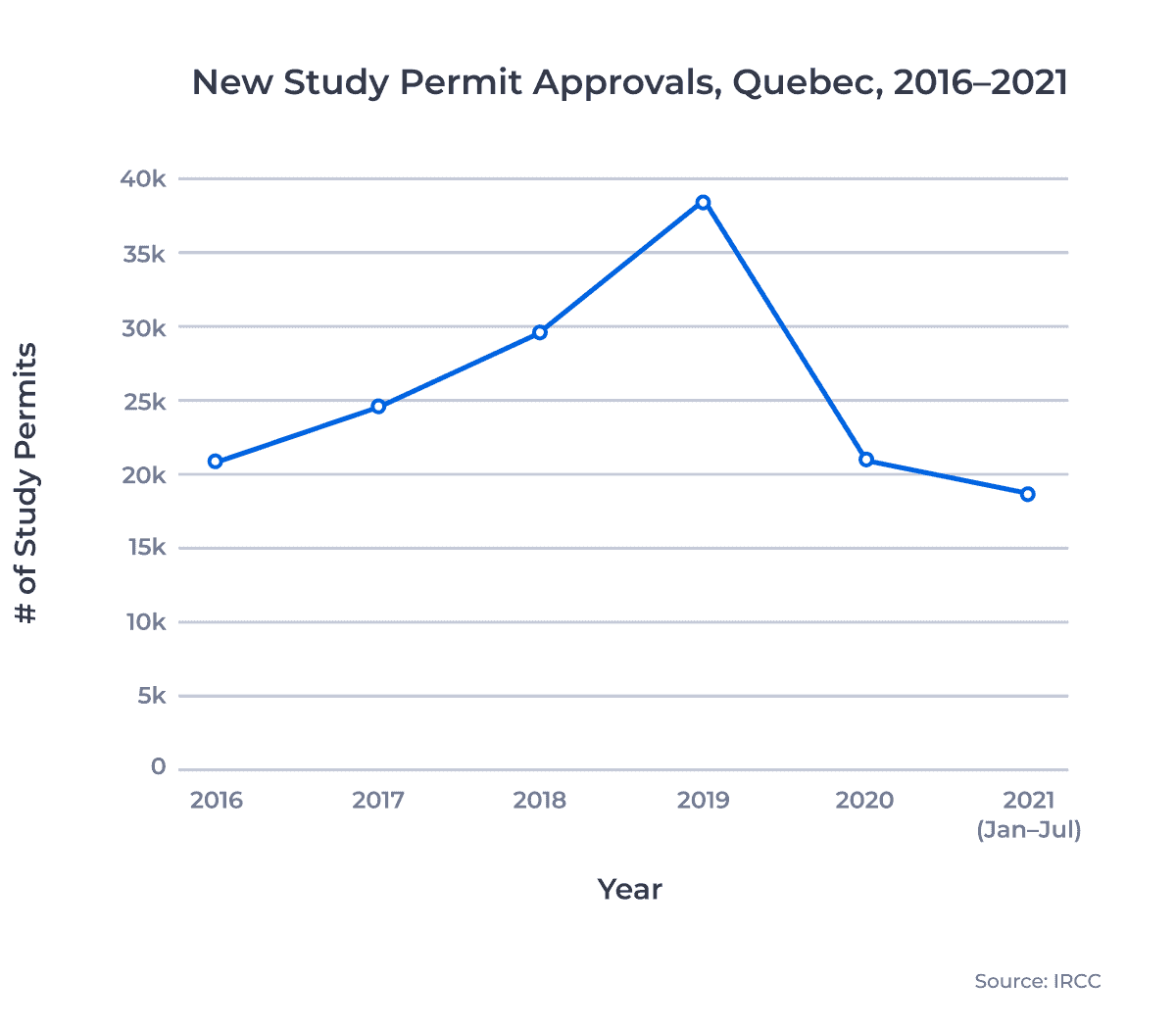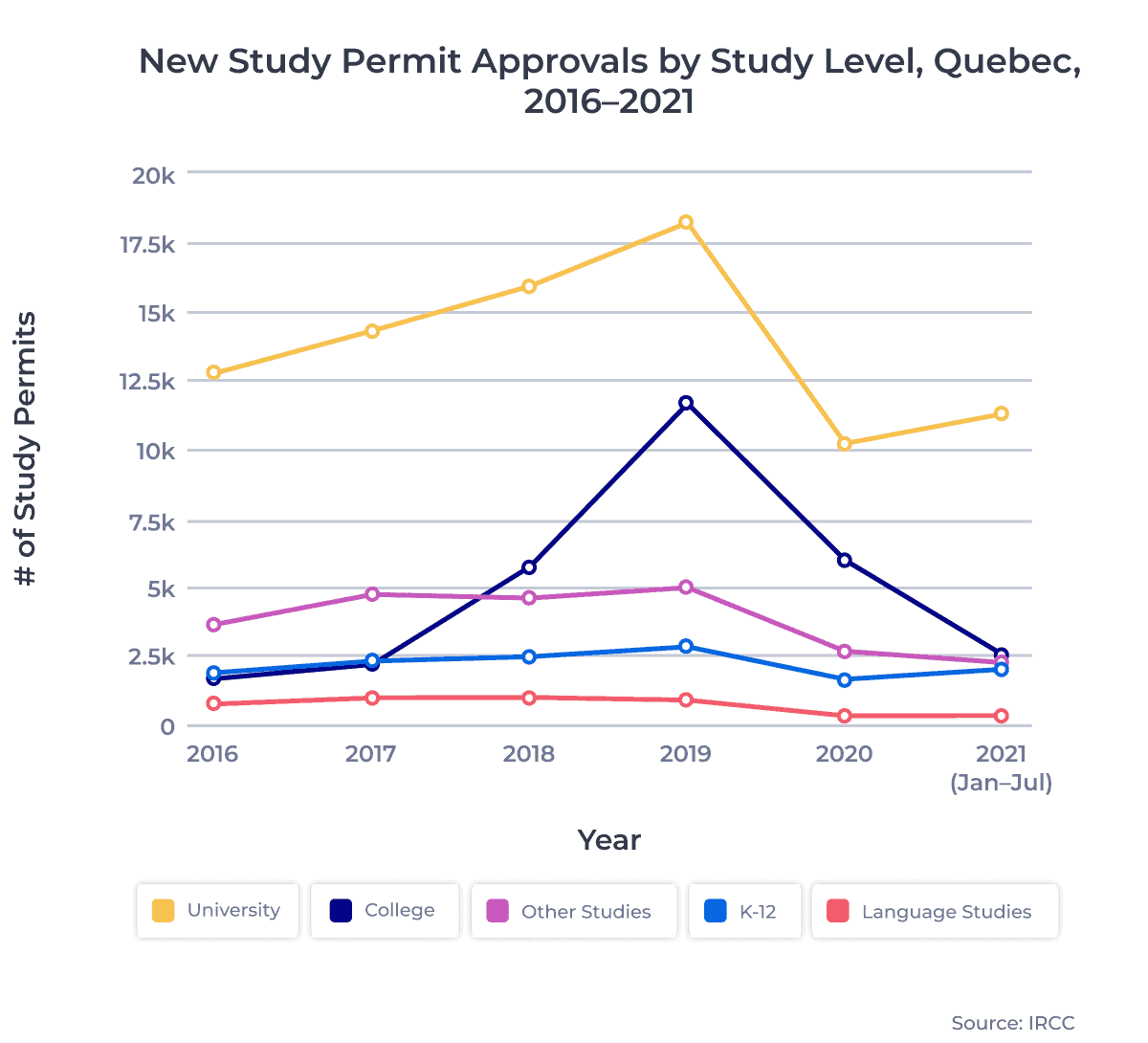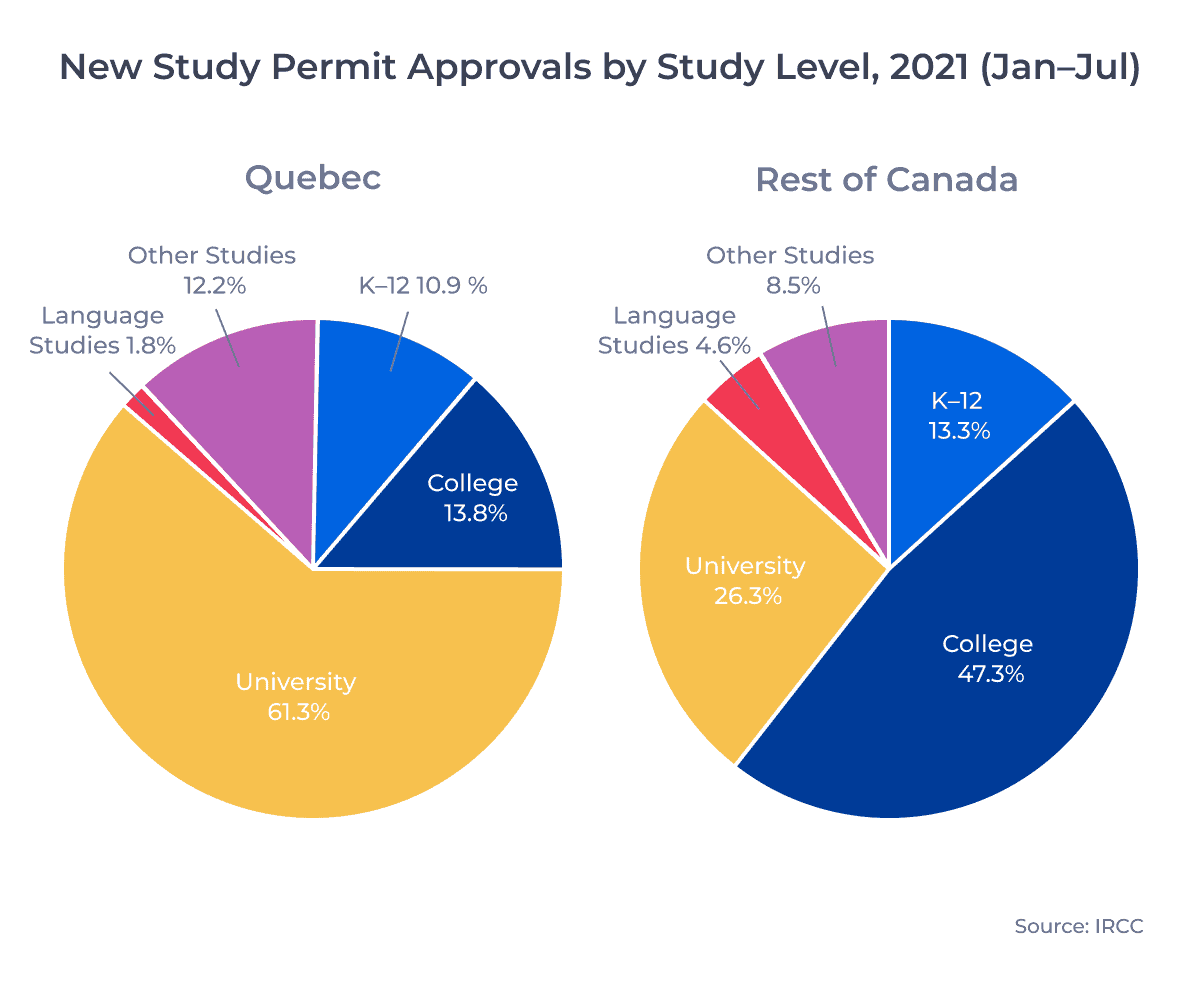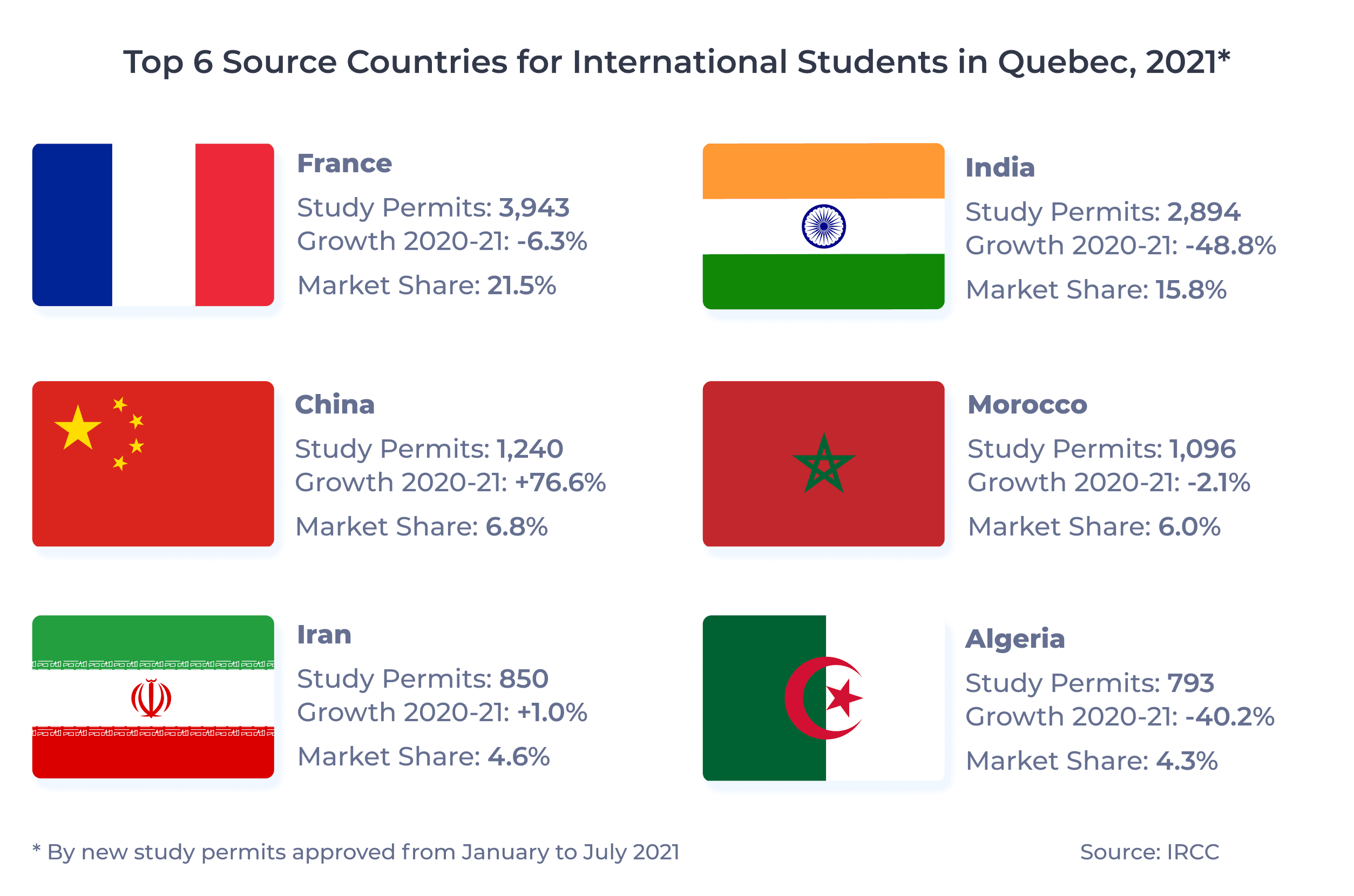Before the pandemic, institutions in Quebec saw rising international student populations year over year. From 2016 to 2019, the number of student visa1 approvals for students applying to Quebec schools nearly doubled. Though the pandemic halted this impressive growth, Quebec’s renowned French- and English-language educational institutions remain highly attractive to students around the world.
In today’s ApplyInsights, I’m going to dive into study permit trends at Quebec institutions. I’ll show how Quebec’s initial post-pandemic recovery compares to the rest of Canada, and I’ll cover the most popular study levels in Quebec. I’ll also dig into the top source countries for international students at Quebec institutions, and I’ll give my thoughts on top emerging markets and the potential for future growth.
Key Insights at a Glance
- Quebec has seen slower post-pandemic recovery than other provinces, although the province’s long-term outlook remains strong.
- Quebec was a university-driven market in 2021, with universities accounting for over 60% of all approved study permits.
- Quebec’s college market has ample recovery potential in 2022 due to unique Post-Graduation Work Permit (PGWP) eligibility for private college graduates.
- Francophone Africa will be the top source region for French-language institutions in the coming years, while India and the Middle East will help drive English-language growth.
This is the third article in our series delving into the Canadian international education market by province. In my previous articles, I detailed study permit trends in Ontario and Atlantic Canada.
Canadian Study Permits Approved – Quebec
Quebec institutions experienced major year-over-year study permit gains pre-pandemic. In fact, by 2019, Quebec looked like it was on track to pass British Columbia as the second most popular provincial destination for international students. Instead, the pandemic halted this impressive growth, as the chart below shows:
Quebec vs. the Rest of Canada
The chart below shows how Quebec compares to the rest of Canada for new study permits approved since 2019:
| 2019 | 2020 | 2021 (Jan–Jul) | ||
|---|---|---|---|---|
| Quebec | Total | 38,505 | 20,751 | 18,369 |
| YOY Change | +30% | -46% | -12% | |
| Rest of Canada | Total | 217,638 | 91,609 | 180,356 |
| YOY Change | +10% | -58% | +97% |
The good news is that Quebec institutions experienced more moderate study permit declines during the pandemic than those in the rest of Canada. Yet Quebec has since fallen behind in the post-pandemic recovery race.3 While busy application periods in August and September will likely help Quebec grow from 2020 to 2021, what’s behind this slow recovery?
Study Permits Approved by Study Level – Quebec
The source of Quebec’s delayed recovery is clear when we take a closer look at popular study levels. The chart below maps new study permit approvals by study level in Quebec over the past five years:
This was largely due to high demand for programs at Quebec private colleges. Unlike other provinces, international students who graduate from private career colleges in Quebec are eligible for the Post-Graduation Work Permit Program. While some issues around Quebec Acceptance Certificate (CAQ) eligibility in 2020 caused students to look at other provincial destinations, those concerns have since been fully resolved. Though new study permits for Quebec colleges dropped 80% from 2019 through mid-2021, we anticipate that Quebec colleges will be in high demand once again in 2022 and 2023.
The PGWP program is a key piece of the value proposition of studying abroad in Canada for international students, and its extension to private colleges gives students more options for study in Quebec.
Quebec’s K-12 sector, by contrast, has already seen strong signs of early recovery. The sector grew by over 50% from 2016 to 2019, before declining by 42% in 2020. But Quebec’s K-12 sector bounced back with 22% growth from January to July 2021 compared to full-year 2020.
Quebec’s university sector is also well on the road to recovery. After a 44% drop in study permit approvals from 2019 to 2020, the sector saw approvals increase by 10% through the first seven months of 2021 compared to full-year 2020. At this rate, we expect to see a 20 to 25% increase by the end of 2021.
Study Level Comparison: Quebec vs. Rest of Canada
How does the popularity of Quebec’s university sector compare to other provinces? The charts below show new study permit approvals through the first seven months of 2021 for Quebec and the rest of Canada:
Even though Quebec institutions only accounted for 10% of all study permit approvals across Canada in early 2021, they accounted for 20% of study permit approvals for universities. Additionally, three of the top 10 universities for international students through the first seven months of 2021 were in Quebec.4 This strong university sector performance will help foster growth throughout Quebec in the coming years.
Top Source Countries for Quebec Students
When it comes to top source countries for international students at Quebec institutions, the pandemic has caused some major shifts. When I looked at top provincial destinations for Indian students in early 2020, I found that India surpassed France as the top source market in Quebec. But study permits for Indian students fell sharply in 2020, while French permit volumes remained fairly stable.
Students from France, India, China, Morocco, Iran, and Algeria accounted for nearly 60% of all approved study permits in Quebec in early 2021.
Among the next tier of top markets, we also expect Morocco and Algeria to grow substantially in 2022. Some Moroccan and Algerian students can take advantage of international tuition exemptions. As well, students from these markets are looking for multilingual study abroad destinations, which can help English and French institutions recruit from these growing African markets.
Find out more about study permit trends for Algerian students and how Canadian institutions can recruit from this growing market.
Top Emerging Markets
As Quebec institutions look towards recovery in 2022, newer emerging markets may be the key to sustained growth. As we detailed in our 2021 Trends Report, many African nations are poised to send substantial numbers of students abroad over the next decade. The following chart highlights the top 10 source markets by growth percentage5 from 2016 to mid-2021:
| Rank | Source Market | SP Approvals, 2016 | SP Approvals, 2021 (Jan–Jul) | Change %, 2016–2021 |
|---|---|---|---|---|
| 1 | Guinea | 62 | 207 | +234% |
| 2 | India | 1,045 | 2,894 | +177% |
| 3 | Colombia | 227 | 627 | +176% |
| 4 | Lebanon | 131 | 315 | +141% |
| 5 | Côte d’Ivoire | 228 | 501 | +120% |
| 6 | Iran | 432 | 850 | +97% |
| 7 | Algeria | 414 | 793 | +92% |
| 8 | Morocco | 606 | 1,096 | +81% |
| 9 | Belgium | 122 | 214 | +75% |
| 10 | Senegal | 231 | 388 | +68% |
For Quebec, large francophone student cohorts from Africa are the future of international education growth. Over the past five years, five of the top ten emerging markets were predominantly French-speaking African countries (Guinea, Côte d’Ivoire, Algeria, Morocco, and Senegal). While these five markets accounted for only 7% of new study permit approvals in Quebec in 2016, they accounted for over 20% in early 2021.
Learn more about how the potential growth of Francophone Africa could impact Canadian institutions.
Quebec institutions also saw higher student volumes from Lebanon and Iran in 2021 than in 2016. This was largely driven by booming Lebanese and Iranian communities in Montreal. These communities help attract students to Quebec institutions while providing them with established cultural bonds, lessening the culture shock that some students experience when studying abroad.
I also want to call out the growth of the Colombian market for Quebec schools. Latin America remains a key potential growth market for Quebec institutions. Among students who speak neither of Canada’s official languages, native Spanish and Portuguese speakers often find it easier to learn French than English.6 This makes Quebec a more attractive study abroad destination and Latin America a critical recruitment region post-pandemic.
Quebec’s Post-Pandemic Rebound
I expect that 2022 and 2023 will be great years for Quebec’s international education sector. Quebec’s robust English and French language education sectors, expanded PGWP eligibility, and vibrant culture will help attract new international students to “la belle province” in the years to come.
At ApplyBoard, we’re getting ready for that growth. We’ve expanded our teams that support French-language applications and we’ve invested in our recruitment teams in Francophone Africa and in other French-speaking countries.
Here are my thoughts on what institutions in Quebec can do to help drive recovery and growth post-pandemic:
- French-language institutions should leverage international tuition fee exemptions to attract students from (traditionally) smaller francophone markets while also increasing recruitment efforts in Francophone Africa.
- Private Quebec career colleges, and recruitment partners who work with these schools, should strongly promote unique PGWP eligibility to help attract students who are looking to work in Canada post-graduation or who hope to pursue permanent residency (PR) long-term.
- All institutions in Quebec should promote Quebec’s unique cultural landscape and the relatively low cost of living compared to metropolitan regions in other provinces (especially Ontario).
Published: December 15, 2021
Subscribe to ApplyInsights
Sign up for the latest insights on international education.
 Meti Basiri
Meti Basiri
Co-Founder and Chief Marketing Officer (CMO)
Meti is driven by the belief that education is a right, not a privilege. He leads the International Recruitment, Partner Relations, and Marketing teams at ApplyBoard, working to make education accessible to people around the world. Meti has been instrumental in building partnerships with 1,500+ educational institutions across Canada, the United States, the United Kingdom, and Australia. Working with over 7,500 international recruitment partners, ApplyBoard has assisted more than 200,000 students in their study abroad journey. Follow Meti on LinkedIn for more access to ApplyInsights and key industry trends.
FOOTNOTES:
1. The terms student visa and study permit are generally used interchangeably for Canadian international students. Rather than student visas, Canada provides accepted international students with study permits, which allow those students to enroll in classes at Canadian institutions. When a student is accepted for a study permit, they are also usually provided with a visitor visa, which allows that student to enter Canada for their studies. Study permit data provided courtesy of Immigration, Refugees and Citizenship Canada (IRCC), except where noted.
2. International students applying to study at a Quebec institution need to secure a Quebec Acceptance Certificate (CAQ) before they can be approved for a Canadian study permit.
3. Based on the most recent available study permit data, which spans January through July 2021.
4. By new study permits approved between January and July 2021. These three universities were McGill University, Concordia University, and l’Université de Montréal.
5. Only considering markets with at least 100 study permit approvals in Quebec from Jan–Jul 2021.
6. French, Spanish, and Portuguese are all in the same language family (Romance languages).



